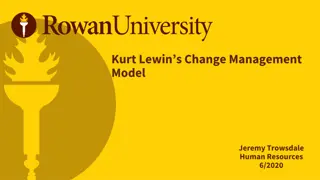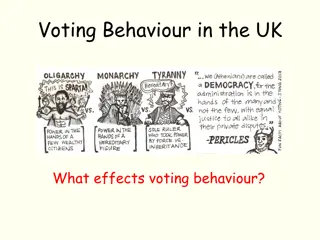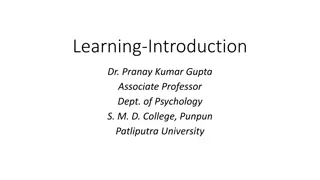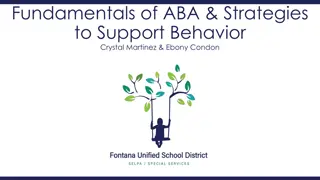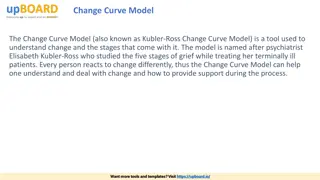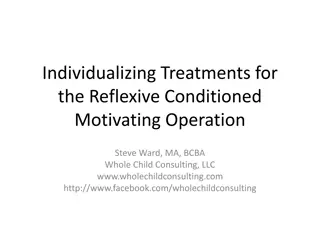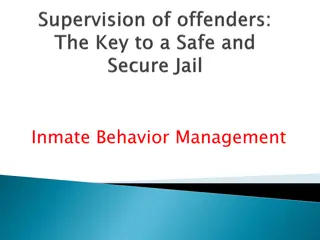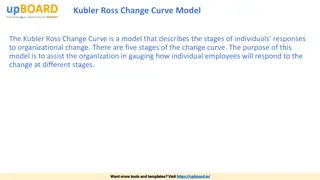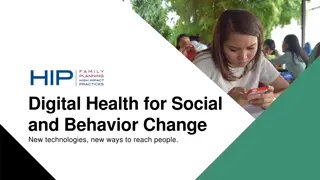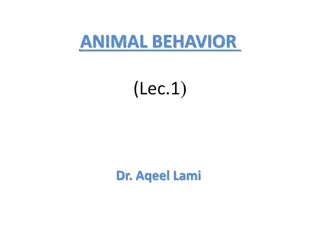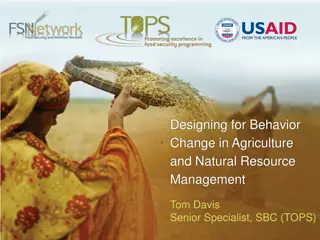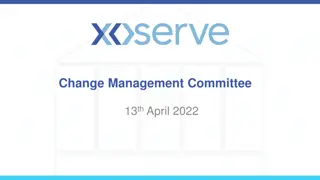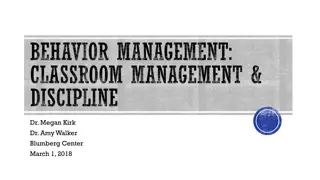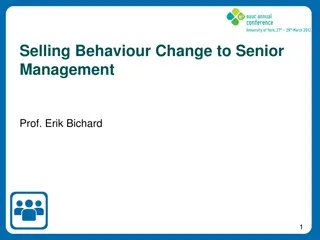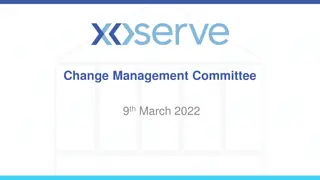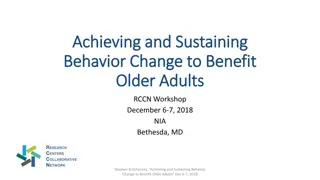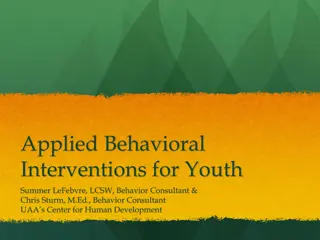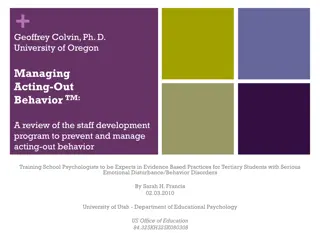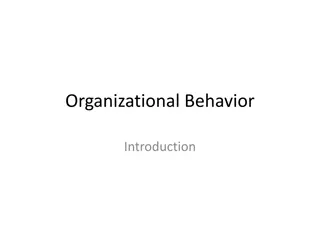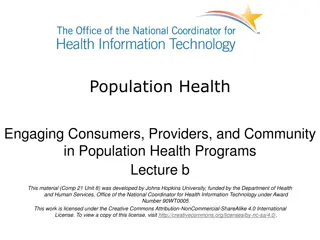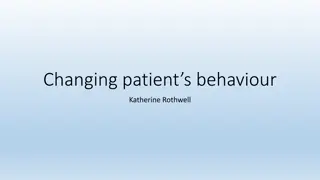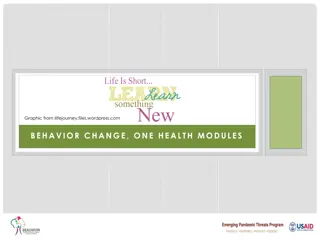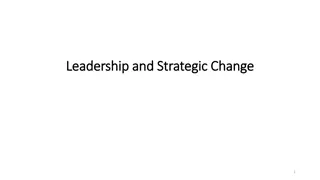Function Based Thinking
Function-based thinking in Missouri Schoolwide Positive Behavior Support, emphasizing data-based decision-making, mission clarity, and effective teaching practices. Understand how behavior is related to the environment and how environmental interventions play a key role in shaping expected behaviors
6 views • 27 slides
Behavior Change for Type 2 Diabetes Management
Discover the impact of physical activity and behavior change in treating Type 2 diabetes. Learn about current trends, team management approaches, and the importance of understanding behavior change to improve outcomes for individuals. Centered on self-efficacy, this insightful session sheds light on
0 views • 31 slides
Addressing Predatory Behavior in the Fellowship
Predatory behavior, especially towards vulnerable members, is a concerning issue in the fellowship. This behavior includes unwelcome advances, exploitation of power dynamics, and institutional sexism. The discussion on predatory behavior necessitates honest dialogue and a united approach for a safer
3 views • 13 slides
Understanding Kurt Lewin's Change Management Model
Explore Kurt Lewin's Change Management Model, its key components, implementation strategies, and the factors that contribute to the success or failure of change initiatives. Learn about Kurt Lewin's background, Lewin's Golden Rules for Change, common barriers to change, and the essential factors tha
1 views • 50 slides
Understanding Voting Behavior in the UK
Voting behavior in the UK is influenced by various factors such as social class, age, location, single issues, party leadership, and media impact. Traditionally, voting behavior was predictable, but recent trends show a shift in party loyalty. Factors such as social class have historically played a
0 views • 26 slides
Understanding Learning: The Cornerstone of Psychology
Psychology delves into the study of behavior and mental processes, with a primary focus on understanding the mental processes underlying behavior. Learning, a key mental process, leads to changes in behavior through maturation and experiences. Defined as a permanent change in behavior or potential i
1 views • 34 slides
Understanding Fundamentals of ABA & Behavior Support Strategies
ABA utilizes evidence-based interventions to enhance skill acquisition and reduce challenging behaviors, focusing on socially significant areas of development. The content covers key concepts such as defining ABA, ABCs of behavior, functions of behavior, and effective strategies to support behavior.
0 views • 29 slides
Understanding Consumer Behavior in Marketing
The design of a marketing program starts with understanding consumer behavior. Consumers, as the end users, play a crucial role in shaping market trends. Producers seek insights into consumer personas, market behaviors, and influencing factors. Management focuses on the consequences of consumer beha
2 views • 26 slides
Understanding Psychology: The Science of Behavior and Mental Processes
Psychology is the scientific study of behavior and mental processes. Psychologists study both observable behavior and private mental processes. The primary goals of psychology are to describe, understand, predict, and control behavior. Different branches of psychology, such as applied psychology, cl
2 views • 29 slides
Understanding the Change Curve Model: A Tool for Managing Change
The Change Curve Model, developed by Elisabeth Kubler-Ross, helps individuals navigate the stages of change by addressing denial, anger, bargaining, depression, and acceptance. This model provides a framework to understand different reactions to change and offers strategies to support individuals th
0 views • 4 slides
Key Insights into Motivational Interviewing for Behavior Change
Explore the essential components of motivational interviewing for behavior change, such as the Spirit of MI, OARS practice, Stages of Change, and ways to elicit and sustain change talk. Discover the key role of client motivation in achieving successful outcomes and challenge common beliefs about wha
4 views • 50 slides
Individualizing Treatments for Reflexive Conditioned Motivating Operation
Understanding the importance of individualizing treatments for escape/avoidance behaviors in individuals with ASD. Factors such as behavior change speed, alternative repertoires, and aversive stimuli considerations are crucial for effective intervention. Generic interventions may not address behavio
0 views • 47 slides
Understanding Inmate Behavior Management in Correctional Settings
Inmate Behavior Management in correctional facilities involves supervising inmates, implementing corrective discipline, and fostering a fair and consistent environment. It emphasizes the importance of behavior management plans, identifying undesirable traits in supervision, and passing educational a
0 views • 19 slides
Understanding Human Behavior: Foundations and Factors
Human behavior is a multifaceted subject influenced by genetic makeup, culture, and individual values. It encompasses both overt actions and covert thoughts, a product of the individual and environmental factors. Psychologists study behavior from visible (overt) actions like playing football to inne
0 views • 20 slides
Understanding Kubler Ross Change Curve Model for Organizational Change
The Kubler Ross Change Curve Model delineates five stages - Decision, Denial, Frustration, Depression, and Experiment - illustrating individual responses to organizational change. Recognizing these stages aids organizations in anticipating and managing employee reactions effectively. Each phase invo
0 views • 4 slides
Understanding Normal and Abnormal Behavior: Perspectives and Definitions
Normal behavior varies from person to person and society, influenced by individual preferences and societal norms. Abnormal behavior is characterized by an inability to function effectively or personal discomfort. The concept of normality and abnormality in psychology raises complex questions about
2 views • 8 slides
Understanding Organisational Culture: Influencing Change & Organisational Cultures
Organisational culture plays a crucial role in influencing change within an organization. The key is to understand and respect the diverse ways people work and make decisions, shaped by their unique cultures. The culture of an organization guides its collective behavior and susceptibility to change.
0 views • 20 slides
Revolutionizing Social and Behavior Change with Digital Health Innovations
Embracing digital technologies for social and behavior change opens new avenues to reach people effectively. High Impact Practices (HIPs) in family planning leverage digital health tools to address systemic barriers, enhance service delivery, and influence positive behaviors and social norms. The us
2 views • 23 slides
Understanding Human Behavior: Insights for Social Workers
This material delves into the intricacies of human behavior, exploring factors influencing behavior such as heredity, environment, intelligence, needs, and motives. It covers the concept of human behavior, stages in life from conception to old age, and theories of human development by eminent psycho
2 views • 71 slides
Understanding Animal Behavior and Ecology
Animal behavior encompasses a range of activities such as feeding, breeding, and social interactions. Ethology focuses on studying behavior in natural environments, while behavioral ecology examines ecological aspects like predator-prey interactions. Sociobiology delves into the evolution of social
3 views • 5 slides
Behavior Change Strategies in Agriculture and Resource Management
Designing for Behavior Change in Agriculture and Natural Resource Management is a crucial aspect of project planning for maximum effectiveness. The training provided offers a practical behavioral framework for food security implementers through sessions focusing on advantages of using DBC, understan
2 views • 28 slides
Change Management Committee Meeting Insights
Delve into the details of the Change Management Committee Meeting held on April 13, 2022. Explore topics such as change budgeting, horizon planning, budget vs. spend analysis, change pipeline, and development and delivery pipeline. Get an overview of the 2021-2022 DSC change and MiR pipeline, as wel
0 views • 55 slides
Understanding Behavior Management in Classroom Settings
Explore the essential topics of behavior management, classroom strategies, and discipline in educational settings. Delve into the functions of behavior, impact of trauma on learning, and effective management techniques. Learn how to identify underlying reasons for student behaviors, discuss behavior
0 views • 76 slides
Understanding and Influencing Human Behavior for Effective Policy Change
In this content, various aspects of human behavior, denial, anxiety, confusion, and common reasons for inaction are discussed in the context of policy and behavior change. The importance of understanding human decision-making processes and the need to change the context to drive behavioral change ar
0 views • 36 slides
Targeting Emotions to Facilitate Behavior Change in Older Adults
Efforts in changing health behavior have traditionally focused on social and cognitive factors, but recent evidence highlights the importance of affective states in decision-making and behavior change. Janey Peterson discusses the role of emotions in achieving and sustaining behavior change to benef
0 views • 11 slides
Grading Criteria for Effort and Behavior in Educational Reporting
Effort and behavior in educational settings are evaluated based on criteria ranging from Excellent to Causing Concern. Pupils demonstrating excellent behavior show respect, responsibility, and positive engagement in learning. Those with good behavior exhibit cooperation and respect for others, albei
0 views • 9 slides
Building Change Competency: Keys to Successful Change Management
Discover the importance of building change competency and the keys to successful change management. Explore why change competency is crucial for organizational success, along with strategies for managing change effectively. Learn about different change management approaches and the benefits of a pro
0 views • 25 slides
Change Management Committee Meeting Overview
The Change Management Committee Meeting on 9th March 2022 discussed the DSC Change Budget, Horizon Planning, Budget vs. Committed Spend, Change Pipeline, and Change Development & Delivery Pipeline, with insights on budget allocation and project progress. New Change Proposals like XRN5482 for meter a
0 views • 61 slides
Achieving and Sustaining Behavior Change for Older Adults Workshop
The Achieving and Sustaining Behavior Change for Older Adults Workshop, held on December 6-7, 2018, focused on theories, consortiums, and goals related to behavior change in older individuals. Key topics included current behavior change theories, planning committees, and desired outcomes such as ini
0 views • 6 slides
Understanding Applied Behavior Analysis (ABA) for Youth Interventions
Applied Behavior Analysis (ABA) is a science focusing on improving human behavior by increasing desired behaviors, teaching new skills, and generalizing behaviors. ABA emphasizes observable behaviors, measurement of behavior change, and the use of interventions in various settings like classrooms an
0 views • 25 slides
PBIS Expectations and Behavior Flowchart
The PBIS flowchart outlines behavior expectations and interventions for minor and major incidents in a school setting. It covers disrespectful behavior, disruption, defiance, property damage, theft, possession of weapons, and more. The flowchart guides teachers and staff on managing and addressing s
0 views • 6 slides
Managing Acting-Out Behavior: A Staff Development Program Review
This review discusses a staff development program created by Geoffrey Colvin, Ph.D., from the University of Oregon, focusing on preventing and managing acting-out behavior in students with emotional disturbance or behavior disorders. The program includes video presentations, strategies for behavior
0 views • 22 slides
Understanding Degrees of Elasticity of Demand
Elasticity of demand refers to the responsiveness of quantity demanded to changes in price. Perfectly elastic demand occurs when there is an infinite demand at a particular price and demand becomes zero with a slight rise in price. Conversely, perfectly inelastic demand occurs when there is no chang
0 views • 11 slides
Understanding Organizational Behavior and Cultural Change
Organizational behavior and business culture play crucial roles in shaping the success and effectiveness of an organization. This content delves into the significance of people as the driving force behind cultural change and highlights the importance of creating a positive work environment for optim
0 views • 30 slides
Understanding Organizational Behavior and Individual Behavior
Organizational Behavior (OB) is a multidisciplinary field that combines knowledge from various disciplines to study and manage organizations effectively. It emphasizes the application of this knowledge to enhance organizational effectiveness and the well-being of participants. OB is a useful concept
0 views • 38 slides
Function-Based Behavior Support Plans: A Comprehensive Guide
Explore the process of developing Function-Based Behavior Support Plans (BSP) using Functional Behavioral Assessment (FBA). Understand the concepts of function and functional behavior assessment, learn how FBA/BSP fits within a multi-tiered support system, and practice developing BSP for students. D
0 views • 74 slides
Understanding Behavior Change Models in Population Health Programs
Explore behavior change models in population health programs, such as the Health Belief Model, Transtheoretical Model, and Chronic Care Model. Learn about theories like Theory of Reasoned Action/Theory of Planned Behavior and their impact on promoting healthy lifestyle choices. Empower individuals t
0 views • 24 slides
Stages of Behavior Change in Patients by Katherine Rothwell
The stages people go through when changing behavior, as outlined by Katherine Rothwell, include contemplation, decision-making, active change, relapse, maintenance, and optimal recovery. Interventions are tailored to each stage to increase the likelihood of successful change, with a focus on underst
0 views • 25 slides
Behavior Change and Health Modules Overview
Explore behavior modification theories, change management concepts, and competency modules to design effective behavior modification strategies for occupational health interventions in communities. Learn the difference between professional-directed and patient-centered behavior change approaches thr
0 views • 41 slides
Leadership and Strategic Change: Key Elements and Managing Issues
This comprehensive guide delves into the intricacies of leadership and strategic change, covering topics such as identifying types of required strategic change, analyzing organizational context influences, conducting forcefield analysis, assessing different styles of managing change, exploring key e
0 views • 33 slides



